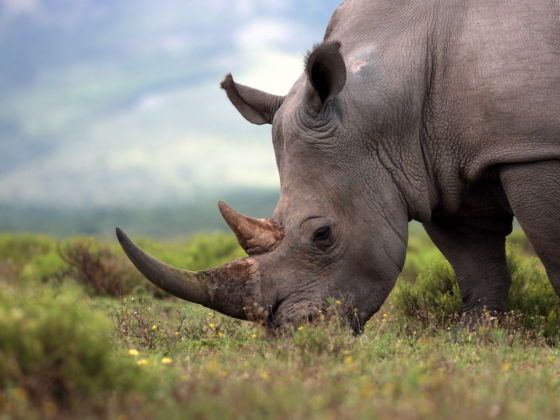BLACK RHINOS ARE QUICKLY DISAPPEARING FROM the earth. Their cousins, the Northern White Rhinoceros, are down to their last living male, and are not expected to reproduce ever again. The last male Northern White Rhino is currently being protected by an armed guard, because even now, with his status as the last standing rhino, poachers would kill him in a second for his horn, which can be sold for absurdly high prices in Vietnam and other Asian countries as a cure for cancer.

This Rich Guy Spent $350,000 to Kill an Endangered Rhino
There is no evidence that this is anything but a myth. But poaching has spiked in the last decade, to the point where rhino populations are seriously threatened. There are less than 5,000 black rhinos left in the world, down from 70,000 50 years ago. As of Monday, there was one fewer: a group called the Dallas Safari Club auctioned off the right to legally hunt a black rhino. The high bid was $350,000 to a man named Corey Knowlton, who, despite protests, followed through on his bid.
You can tell straight away he’s only killing things for the good of the species right? pic.twitter.com/7denSMeNdQ
— Ricky Gervais (@rickygervais) May 21, 2015
While it would seem obvious that killing an endangered species is a pretty messed up thing to do, the ugly truth is that Knowlton’s bid may have done a disproportionate amount of good for local rhino conservation groups.
Severe underfunding for conservationists.
Knowlton himself claims to be an animal lover (though he’s also an avid hunter, and regularly posts pictures of his kills on social media), and there’s some evidence backing that up: Rhino conservationists face the problem of being severely underfunded, while also having to deal with the fact that rhinos mostly live in relatively impoverished countries where the potential gains of poaching animals are worth the risks. Save the Rhino, a Namibia-based Rhino conservation organization, said this of the Dallas Safari Club auction:
“Well yes, it would be nice if donors gave enough money to cover the spiralling costs of protecting rhinos from poachers. Or if enough photographic tourists visited parks and reserves to cover all the costs of community outreach and education programmes. But that just doesn’t happen. It costs around $500,000 a year to run a relatively small rhino programme with only 20-30 animals. Heaven only knows how much it costs to run Kruger National Park in South Africa, or Etosha National Park in Namibia.
“Fundraising for rhinos is hard. We’re not just competing for funds against other endangered species – elephants, tigers, polar bears, pandas – but against cancer charities, children’s charities, or the most recent natural disaster. In “An inconvenient truth”, Al Gore asserted that 97% of charitable giving goes to people-related causes and 1.5% to pet charities, leaving only 1.5% for the conservation of our entire planet. Are enough new rhino-focused donors really going to come out of the woodwork to make income from trophy hunting unnecessary?”
Save the Rhino’s point of view is not universally held among conservationists, and many point out the hypocrisy of paying money to kill an endangered species while claiming it’s for the preservation of said species. Others still point out that it would not be difficult for hunters to simply not kill the animals and donate the money anyway. But the fact remains that the money from the auction is set to go to local conservation and community development efforts.
Where does this leave us?
Monday, a black rhino died at the hands of a wealthy hunter. This has received a lot of press. What does not receive a lot of press is the constant poacher killings of black rhinos throughout Africa, at rates of hundreds per year. While the public has every right to see the “I’m killing them for their own good,” mentality as more than a little contradictory and perverse, it seems slightly hypocritical that such a stink is being made over a single sport hunter when poachers are doing the same thing on a much more regular basis (and without donating any of their profits to local conservation efforts).
If the public has a serious interest in ending trophy-hunting, then they can start donating in large amounts to conservation groups themselves. Some good places to start are the David Sheldrick Wildlife Trust, the Save the Rhino Trust (which is notto be confused with the Save the Rhino mentioned earlier in the article, and the World Wildlife Fund.